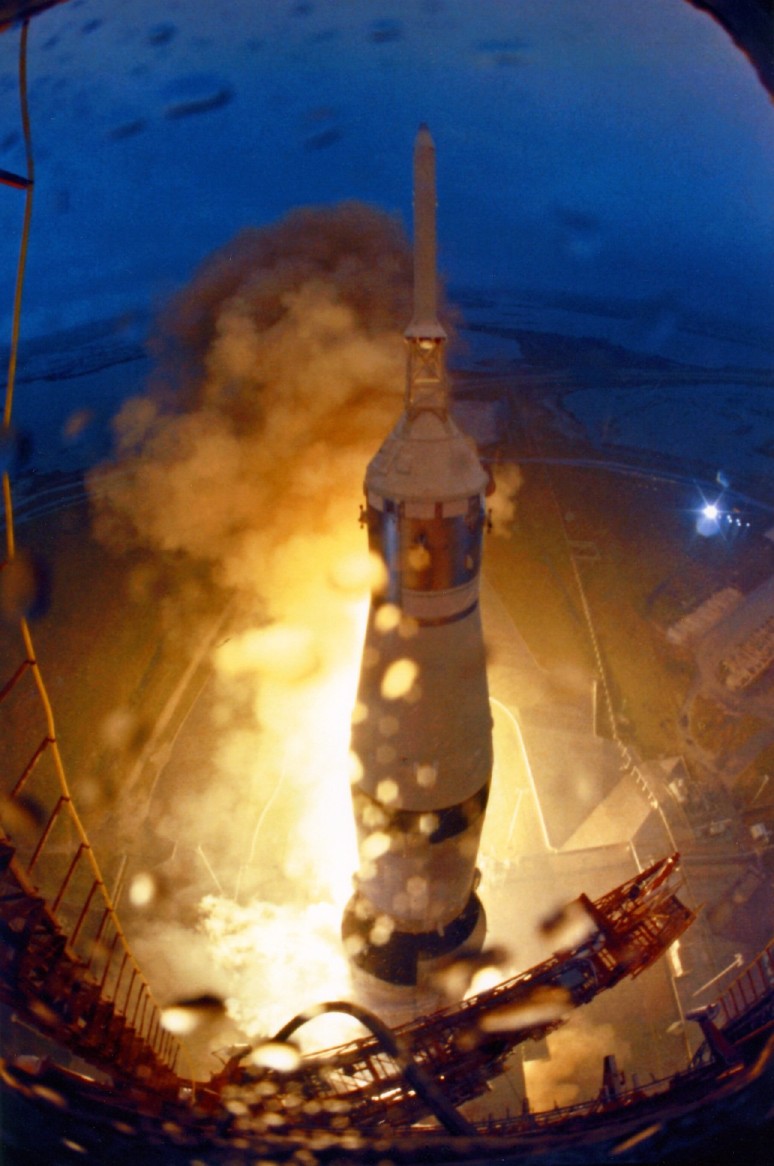The next day, November 20, Conrad and Bean again left their lunar module for a second three-hour mission, collecting dirt rocks and other lunar samples for transportation back to Earth, walking in an extended circle going more than 1300 feet from the relative safety of Intrepid and slowly making their way to the waiting Surveyor III. At the unmanned vessel, the astronauts collected samples of glass, metal and other materials, as well as cabling from a television camera that mission control was aware bacteria had grown in and which they wanted to see how they had fared in the harsh lunar environment (spoiler: they died).
[yframe url=’http://www.youtube.com/watch?v=Qhgq19u28Fk’]
That same day after eating and some much-needed sleep, about 31 hours after they had arrived, Intrepid’s rockets fired sending the lunar module hurdling back into orbit to rendezvous with Dick Gordon aboard the Yankee Clipper. Safely aboard the command module, Conrad and Bean stored their specimens. After two more orbits of the moon, while Gordon completed photographing potential future landing sites, Conrad gave the command, the rockets were ignited, and the three men began their long voyage home.
It was an uneventful flight back to Earth for Apollo 12, filled with celebratory television interviews granted from the depths of outer space, happy messages from family and friends at home, and the satisfaction of a mission well done. Yankee Clipper splashed down safely in the Pacific Ocean on November 23, 1969. However, as the command module hit the ocean Alan Bean was knocked unconscious when a motion picture camera fell loose from its storage area hitting the astronaut in the head and causing a concussion. Fortunately, Bean’s injury would turn out to be minor. Plucked from the ocean and safely ensconced in their isolation quarters, the crew of Apollo 12 were safe, their mission successfully completed.
Conrad and Bean’s mission on the lunar surface had lasted 10 hours longer than Armstrong and Aldrin’s mission earlier that year. Intrepid had two different missions outside of the craft, both of which were longer then Armstrong’s walk. Apollo 12 had landed within yards of its objective and had lasted within a minute of its planned mission time. Problems and issues that had to be worked out along the way didn’t keep the second moon landing from succeeding better than mission control had hoped for. Mission objectives have been met, a wide variety of specimens had been gathered, including the pieces recovered from Surveyor III. The mission had succeeded in every objective, despite the scary beginning. Yet once Conrad, Bean, and Gordon were taken from their vessel and placed in isolation, it wasn’t long before they faded into historical obscurity as well.
At the time of their flights Conrad, Gordon, and Bean were household names. However, with our goal accomplished and man actually walking on the moon, it didn’t take long before the American public grew bored with the space race and turned their attentions to other things. Where once everyone who had a television had turned to watch the wonder of human beings walking on another world by the time of Apollo 17, people were calling into network television complaining about having their soap operas and game shows preempted. Now that we had succeeded and reached our goal ,America was happy to take a victory lap and move on. Unfortunately, being the 1970s, that translated into unstable relationships, cult membership, and dancing at four in the morning to repetitive music while wearing rayon clothing and intoxicated on mysterious but addictive powders administered through the nose. Not saying a continued emphasis on the space program would’ve made things any different, but all things considered, it couldn’t have hurt.
Pete Conrad died in 1999, but Alan Bean and Dick Gordon are chugging along and looking healthier than most of us could ever hope for at their ages. After the moon landing faded from the majority of the country’s memory, all three men remained well-known heroes in the aeronautic and engineering community and were still able to move back into private life without the dubious pleasure granted by the never-ending glare of celebrity. The two astronauts are older now and quietly living their lives. For all you know, you stood by them last week at the grocery store or the car wash. Bean and Gorden are collegiate types and have a more professor-like appearance than astronaut now, but they remain part of a very small fraternity of human beings who left the Earth behind them and walked firmly on the ground of another world. Armstrong and Aldrin came first, the trailblazers who led the way, but men like Conrad, Bean, and Gordon were as heroic and deserve to be honored for their part in taking all of us on our next step into the future.


Comments are closed.